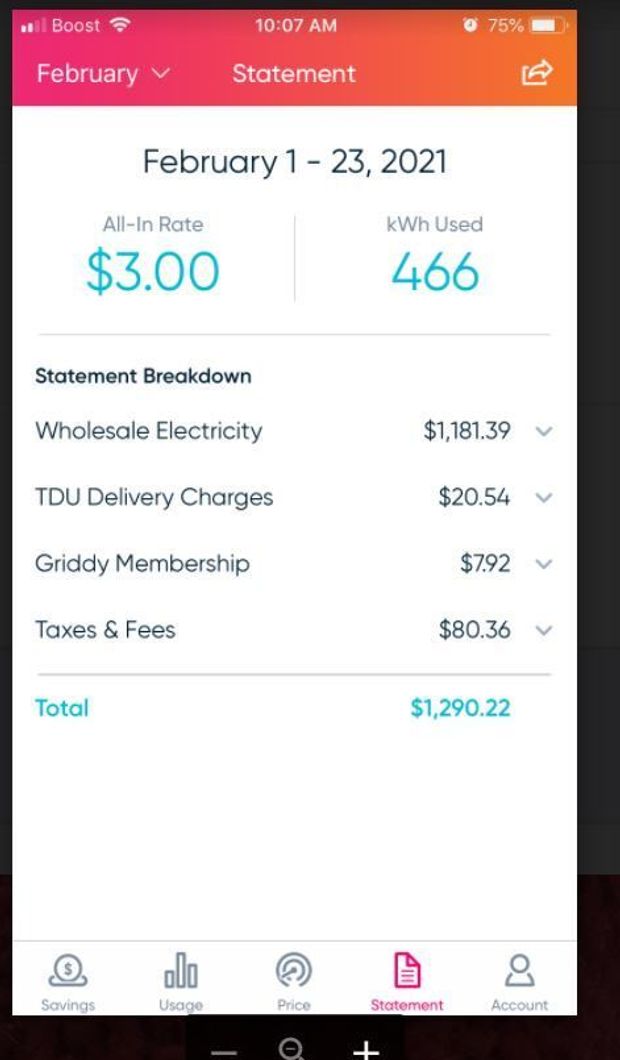As the winter storm tore into Texas earlier this month, it took just a few days for one mom to rack up an electric bill that was nearly triple what she paid during all of last year.
While temperatures plummeted, Frisco resident Liz Guess’s utility provider, Griddy, charged her credit card 15 times due to an automated debit that kicked in for any balance due over $75.
“I was just panicking, calling anybody and everybody to figure out how to stop the hemorrhaging of money,” Guess told MarketWatch.
She never lost power, but turned the heat down to 60 degrees and unplugged everything else.
She credits Griddy for sending emails to customers ahead of the storm warning of the potential for higher bills, but the messages got caught in her junk mail. After one email slipped through to her inbox, Guess unsuccessfully tried to get through to a Griddy customer service representative. Meanwhile, her credit card company told her she couldn’t block the charges because they weren’t fraudulent.
“ ‘I was just panicking, calling anybody and everybody to figure out how to stop the hemorrhaging of money.’ ”
Now that the storm has passed, Guess is staring at $1,125 in utility charges on her credit card. She paid approximately $420 for utilities last year. Her bill for one day, Feb. 16, was $230.
“That kind of bill sets us way back,” said Guess, 36, who stays at home with her one- and three-year-old children while her husband teaches high schoolers. She’s set up a GoFundMe page and raised half of her $1,200 goal (which includes taxes and fees on top of the base bill). Guess has contacted her state and federal representatives to see how they can help. She’ll dispute the charges on her card.
Guess is one of many consumers left with suddenly massive utility bills in the wake of the one-two punch of a winter storm that first knocked power out for millions, brought historic cold and then brought bigtime utility bills — during a pandemic with serious economic fallout. Other Texans say they have even larger bills, including one man who faces a nearly $17,000 bill.

Liz Guess is pictured with her husband and daughter. The family has turned to crowdfunding to cover the costs of the utility bill they face after Texas’ winter storm.
Courtesy of Liz Guess
“Texans shouldn’t have to face a spike in their energy costs,” Gov. Greg Abbott said on Twitter TWTR, +3.80%. “We are working to fix this fast.”
In a statement to MarketWatch, a Griddy spokeswoman said, “Since this occurred, we’ve had all hands-on deck answering emails, responding to voicemails, and interacting with individuals on social media. We are truly sorry our members have had to wait. We didn’t forget about them. We’ve been responding to everyone we can in the order we receive them and are here to help them the best we can in this situation.”
The Public Utility Commission of Texas immediately suspended any disconnections of service for non-payment, effective Sunday. The moratorium is in place until further notice, the commission said.
Meanwhile, Guess is trying to game out her next move. If she and her husband have to pay the bill, they’ll have to figure out an installment plan and shave money off their groceries.
That’s definitely not something she wants to do with two young kids. “When they are hungry, they are hungry.”
Why are Texans getting huge utility bills?
Texans like Guess are in this position, in part, because of the state’s unusual electricity market. More than a dozen states, plus the District of Columbia, have deregulated electricity markets, which allow households to choose who their electricity provider is.
Of these states, Texas is reported to be the closest to fully deregulated. A 2019 report from the U.S. Energy Information Administration found that 58% of residential customers participated in a customer choice program, well above the rates in all other states. “Texas is unique in that they expect everyone to have a retail provider,” said Ken Rose, a senior fellow at the Institute of Public Utilities at Michigan State University.
In most deregulated states, customers merely choose which company provides their energy. But in Texas, some companies offer different pricing options for customers. Households can opt between paying a flat rate for the electricity they use or paying a variable rate that is tied to the wholesale price of electricity.
Often, customers will pay less for their electricity on a variable rate plan. “Retail customers are lured by that, but they don’t realize there is a risk of sky-high prices,” Rose said.
Texas has seen a home-building boom in recent years, and most new homes are heated by electricity. Demand for electricity went through the roof when temperatures dropped across the state during Winter Storm Uri. At the same time, cold temperatures and snow hampered power generators’ operations.
“ ‘Retail customers are lured by [low rates], but they don’t realize there is a risk of sky-high prices.’ ”
Many people lost power during the storm, but even still the high demand and hamstrung supply made for astronomically high wholesale prices. “It sounds like it was just a genuine power shortage, and when the power is that short the price goes to the price ceiling,” said Severin Borenstein, faculty director of the Energy Institute at the Haas School of Business at University of California, Berkeley.
As a result, customers on these variable plans who regularly pay less than 10 cents per kilowatt-hour were expected to pay $9 per kilowatt-hour.
Griddy, one of the electricity providers that offers variable pricing, described those costs as “non-market pricing” and said it it was “engaged with ERCOT and the PUCT to seek customer relief.”
“If Griddy receives any relief, we will pass it through to our customers dollar for dollar,” a Griddy spokeswoman told MarketWatch.

A screenshot of Liz Guess’s electricity bill.
An ERCOT spokeswoman said customers should contact their electric company for any questions about their bill. “Different companies have different rate plans, and we have no way of knowing the breakdown of those on fixed or variable plans,” she said.
Texas law does have some protections guarding consumers from sudden price hikes, “but they are largely toothless and people should not be relying on the currently in-place protection,” said Bay Scoggin, director of TexPIRG, the Lone Star-state affiliate of U.S. PIRG, the national consumer advocacy group. Stronger regulation is needed in his view.
“It’s tragic that we have dual disasters in this state right now. As if a global pandemic wasn’t enough,” he said.
What consumers can do if they’re facing a massive bill
Consumers who have an automatic debit on their accounts need to move especially swiftly to get to the bottom of what’s going on with their account, according to Scoggin.
For now, it appears the only consumers facing massive utility bills are people who get their power in the deregulated market with a variable wholesale plan, he said. Most Texans are on a fixed rate plan, he noted.
Consumers should start by understanding whether they have a fixed or variable rate plan. This information is contained in a provider’s “Electricity Facts Label,” which is likely somewhere in the initial documentation signing up a customer.
Once confirming it for themselves, customers should double-check by having the utility confirm the point as well. From here, customers have a couple of options.
Given the government focus on these high bills and potential for relief, “I think it makes sense for people to hold off to the extent that they can on paying these exorbitant bills,” Scoggin said.
But consumers can also see whether the utility will negotiate an installment plan. Scoggin and other experts say power providers are open to figuring out payment plans.
If people are going to shop around for a different utility provider, it’s very important they have their new provider lined up and confirmed for service before ending their current account, Scoggin said.
Guess acknowledged she did save money with Griddy last year. “We’ve been staying with them for now. When we understand what’s happening we’ll be switching off. … There was no way to anticipate there would ever be something like this,” she said.










Add Comment